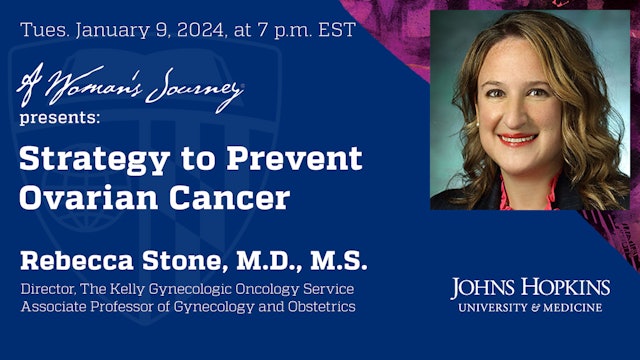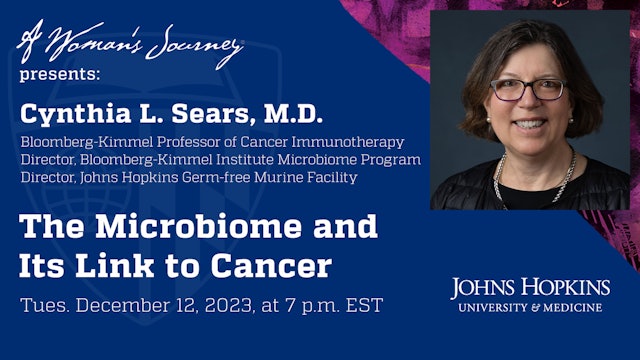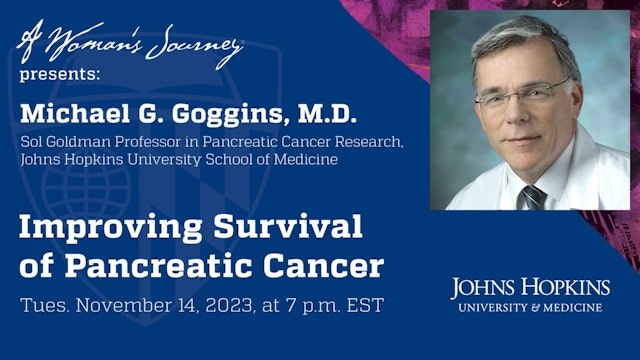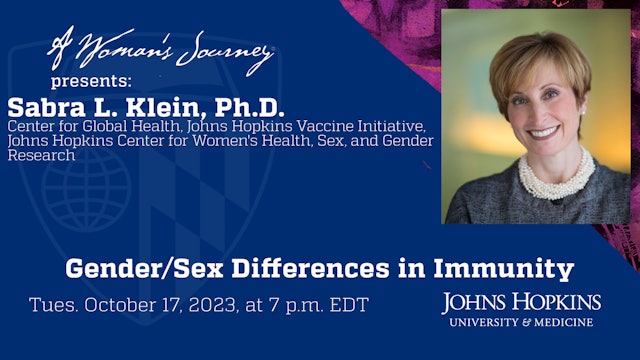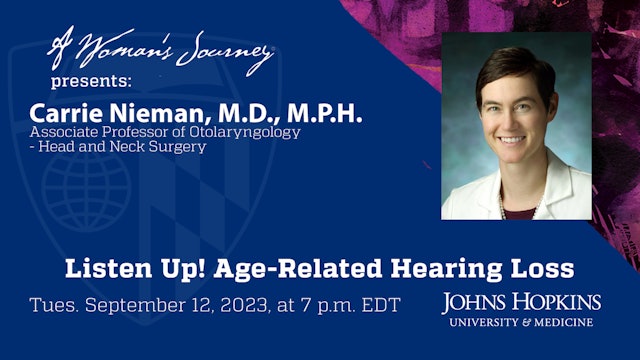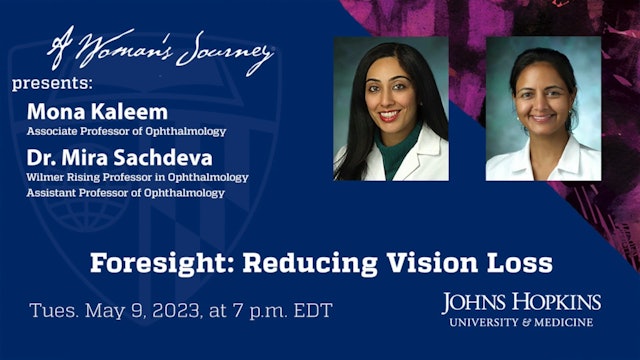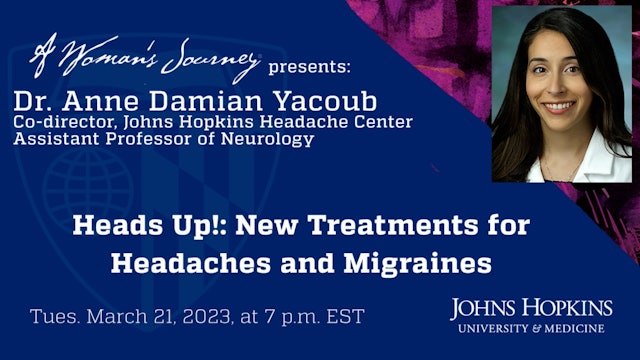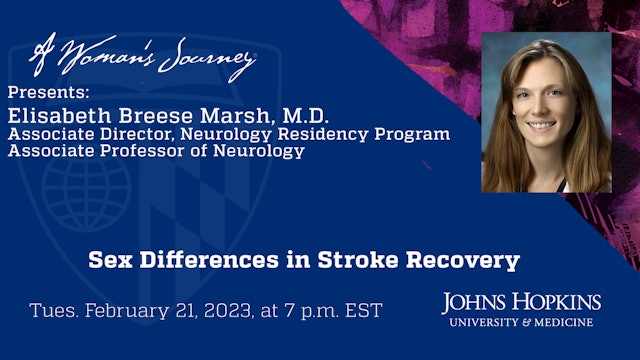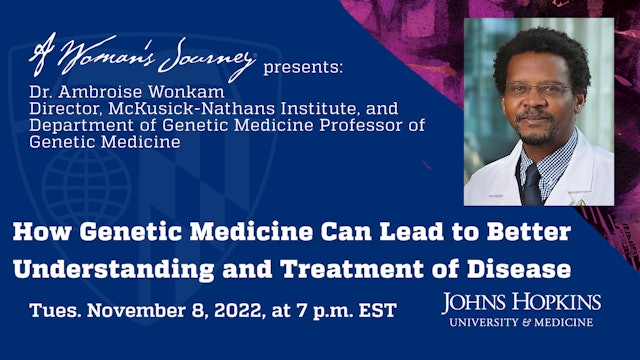-
A Woman's Journey: Strategy to Prevent Ovarian Cancer
Did you know every 40 minutes a woman is diagnosed with ovarian cancer? Could the removal of your fallopian tubes (salpingectomy) save your life?
A Woman's Journey national chair Kelly Ripen speaks with gynecologic oncology surgeon Dr. Rebecca Stone about the need for early detection and innovat...
Extras
-
A Woman's Journey Managing Your Microbiome: How It May Help Your Health
A Woman's Journey: Conversations that Matter December's monthly Hopkins at Home features infectious disease and cancer researcher Dr. Cynthia Sears discussing what the microbiome is, what changes it, and how emerging discoveries have revealed its broad impact on health and disease. Dr. Sears disc...
-
A Woman's Journey: Improving Survival of Pancreatic Cancer
Early detection plays a vital role in treating pancreatic cancer and increases the chance of surviving the lethal disease. Learn from cancer pathologist Michael Goggins, director of the Pancreatic Cancer Early Detection Laboratory, about new strategies — including identifying gene variants respon...
-
A Woman's Journey: Gender/Sex Differences in Immunity
Research is exploring the differences between men and women in underlying hormonal and genetic factors affecting health. Biologist and researcher Sabra Klein will explain her research focusing on sex hormones and how they may influence how men and women respond to infections and vaccinations.
Dr...
-
Hopkins at Home presents, A Woman's Journey: Listen Up! Age-Related Hearing Loss
Some change as we age is unavoidable, including in our hearing, and the availability of over the counter hearing aids is growing. Learn from otolaryngologist Carrie Nieman what is typical age-related hearing loss, and which treatment options are available and which may be best suited for various ...
-
A Woman's Journey - Foresight: Reducing Vision Loss
Want to learn about the latest efforts to reduce glaucoma, age-related macular degeneration and diabetic retinopathy — the most common causes of vision loss? Join two experts from the Wilmer Eye Institute at Johns Hopkins —glaucoma and cataract opthalmologist Mona Kaleem, M.D. and retina ophthalm...
-
When Your Head Is Splitting: Headaches and Migraines
Headaches and migraines can stop us in our tracks, and chronic headaches and migraines can completely derail our lives. How do you tell the differences between headaches and migraines? Neurologist Anne Yacoub examines the many different types of headaches and their causes, defines the similaritie...
-
Sex Differences in Stroke Recovery
There are many differences between the sexes, particularly regarding stroke prevention and recovery. Join Elisabeth Marsh, M.D., cerebrovascular neurologist and director of the comprehensive stroke center at Johns Hopkins Bayview Medical Center, as she explains differences in stroke etiology and ...
-
When Your Head Is Splitting: Headaches and Migraines
Headaches and migraines can stop us in our tracks, and chronic headaches and migraines can completely derail our lives. How do you tell the differences between headaches and migraines? Neurologist Anne Yacoub examines the many different types of headaches and their causes, defines the similaritie...
-
Secret (and Not So Secret) Signs of Arrhythmia
Just what causes a cardiac arrhythmia? What are the signs you are experiencing an arrhythmia? What are the different types of arrhythmias? Get the answers to these questions and more, and learn about the various approaches to monitor your heart rhythm, with Hugh Calkins, M.D., cardiologist and di...
-
Fact or Fiction? Combating Common Myths about Eating Disorders
Who is more prone than others to develop an eating disorder, and what are the signs and symptoms? Do you have questions about how to prevent or treat eating disorders? Clinical psychologist Colleen Schreyer, Ph.D., will answer these questions and debunk common myths about eating disorders.
Dr. C...
-
How Genetic Medicine Can Lead to Better Understanding and Treatment of Disease

